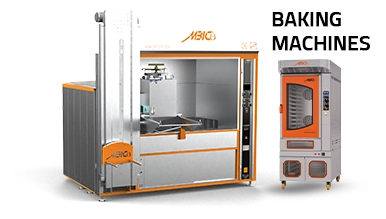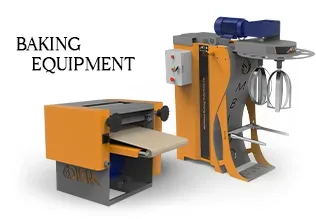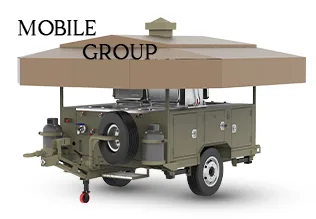In the chaotic aftermath of a major disaster, the immediate needs of affected populations are paramount. Beyond shelter and medical aid, the provision of safe and nutritious food emerges as a critical factor for survival and recovery. The logistical challenges of feeding thousands, or even millions, of displaced individuals when infrastructure is severely damaged or completely absent can be overwhelming. Traditional food supply chains often collapse, leaving communities vulnerable and exacerbating the crisis. In this context, mobile cooking containers have emerged as a dynamic and increasingly vital solution, offering a means to directly address the urgent need for sustenance. These are not merely kitchens on wheels; they represent self-contained, rapidly deployable units designed for mass feeding in the most demanding circumstances, playing an essential role in maintaining health, morale, and the very fabric of community resilience.
Mobile baking machines, in their essence, are fully equipped, portable kitchens designed to bring quality meal preparation and food services directly to where they are needed, whether it be communities, events, disaster areas, or remote work sites. These units encompass a diverse range of apparatus and equipment used to cook, prepare, or serve food, and are characterized by their ability to routinely change location, operating from movable vehicles or apparatus, including motorized vehicles, trailers, and even hand-propelled carts. Within the context of disaster relief and crisis management, their purpose extends beyond simply providing food. They serve as a crucial intervention to nourish those affected, offering a semblance of normalcy and comfort amidst the turmoil of a crisis. By ensuring access to hot, safe, and nutritious meals, mobile kitchens play a significant role in maintaining the energy and health of both disaster victims and the relief workers who are tirelessly assisting them.
The effectiveness of mobile cooking containers in disaster and crisis scenarios stems from their key features and inherent capabilities. Many units are equipped with commercial-grade cooking equipment, including stoves, ovens, refrigerators, freezers, and sinks, enabling them to handle a full range of cooking needs and facilitate efficient, large-scale meal preparation while adhering to stringent food safety standards. Self-contained water systems, providing both hot and cold water for food preparation, cleaning, and handwashing, are crucial in disaster settings where running water may be compromised or unavailable. Power generation, often through onboard generators, allows these mobile kitchens to operate independently of damaged power grids. Ample storage for ingredients and supplies ensures that the kitchens can function autonomously for extended periods. A critical advantage lies in their rapid deployment and setup capabilities, with some units designed for extremely fast operational readiness, minimizing the time before meals can be served. Built to withstand harsh conditions, these containers often feature durable and weather-resistant materials, ensuring reliability in extreme environments. Furthermore, the versatility of multi-fuel options, such as diesel, propane, or electricity, provides operational flexibility in resource-limited locations. Mobile kitchens come in various forms, from standard truck or trailer configurations equipped with climate control, ventilation, and onboard fuel supplies , to more specialized units like food trucks and even repurposed shipping containers that can be modified into functional commercial kitchens. The adaptability in design and functionality allows for a tailored approach to meet the specific demands of different crisis situations.
The concept of mobile kitchens in humanitarian efforts is not entirely new, with early forms likely emerging from military campaigns where feeding troops on the move was essential. However, the increasing frequency and severity of natural disasters and humanitarian crises in recent history have significantly amplified the recognition and advancement of mobile kitchen technology. Major events like Hurricane Katrina in the United States exposed inefficiencies in disaster response, directly leading to the development of more sophisticated and rapidly deployable mobile kitchen solutions. Over time, mobile kitchens have evolved from basic field setups to highly advanced, self-contained units incorporating features like large-capacity ovens, griddles, sanitation systems, and even computer information systems. This evolution reflects a continuous drive to improve efficiency, capacity, and the ability to operate in increasingly challenging environments.
The real-world impact of mobile cooking containers in alleviating suffering and supporting recovery after disasters is profound and well-documented through numerous case studies across the globe. Following Hurricane Debby in Florida in 2024, World Central Kitchen’s Rapid Response Field Kitchen was deployed to quickly reach isolated areas, demonstrating the speed and agility of these units. In the aftermath of Hurricane Maria in Puerto Rico, the Kentucky Air Guard’s 123rd Services Flight utilized a Disaster Relief Mobile Kitchen Trailer to cook thousands of meals daily for relief forces, showcasing the significant capacity these kitchens can offer. The North Carolina Baptist Men’s “Manna One” kitchen trailer served tens of thousands of meals to those left homeless and hungry after Hurricane Irene swept up the East Coast, highlighting the crucial role of volunteer organizations in deploying these resources. Even in the face of challenging terrain, as seen after the devastating earthquake in Morocco’s Atlas Mountains, World Central Kitchen teams ingeniously used donkeys to transport kitchen equipment to remote villages, ensuring that even isolated communities received vital food aid. The versatility of mobile kitchens is further exemplified by the semi-truck kitchen originally used for the #ChefsForUkraine effort, which later played a vital role in Spain, providing meals to families impacted by devastating floods. In the context of wildfires, World Central Kitchen deployed its mobile kitchen to the California wildfires, providing essential meals to both the firefighters battling the blazes and the residents who were affected.
The strategic deployment of mobile kitchens
Beyond natural disasters, mobile kitchens have proven indispensable in supporting populations affected by refugee and displacement crises. When Mission Eurasia’s mobile kitchen arrives in a devastated Ukrainian town, it becomes a beacon of hope, providing hot meals to villagers who have endured unimaginable hardships. Following floods in Timor-Leste, mobile kitchens were deployed alongside water purification systems to distribute hot meals to the local community, illustrating their role in comprehensive humanitarian responses. The initiative of Tauranga baker Harriet Campbell to raise funds for a mobile kitchen in Ukraine to deliver hot meals to soldiers and civilians underscores the recognized need for these facilities in conflict zones. California Mobile Kitchens (CMK) also highlights the broader role of mobile kitchens in serving survivors in evacuation areas and communities where food services are unavailable during various types of humanitarian emergencies.
The value of mobile cooking containers in times of crisis is powerfully echoed in the voices of those who have experienced their impact firsthand. Following Hurricane Helene, the owners and staff of MacRae’s Bait and Tackle in Homosassa acknowledged that the food provided was precisely what they needed to move forward with their recovery efforts. World Central Kitchen emphasizes the profound impact of their semi-truck kitchen, stating that it is capable of “doing amazing things for communities impacted by natural disasters or conflicts” and highlighting its crucial role in delivering thousands of meals in Ukraine during the most challenging times. Cotton Culinary underscores the dual benefit of mobile kitchens, noting their ability to take food “where most needed” for both relief workers and disaster victims, all while maintaining the highest level of food safety. Bill Hague, involved in the development of Disaster Relief Mobile Kitchen Trailers, explains that these units were designed with efficient setup and shutdown procedures to “feed those in need quickly,” directly addressing the inefficiencies observed during the response to Hurricane Katrina. Furthermore, a news report featuring an American Red Cross mobile kitchen in Long Island, New York, during the aftermath of Hurricane Sandy, showcases the collaborative efforts between organizations like the Red Cross and the Southern Baptist Convention to cook thousands of meals daily for those affected.
The strategic deployment of mobile kitchens is crucial to maximizing their effectiveness in disaster response. One of their most significant advantages is the speed at which they can be deployed and become operational, a critical factor in the immediate aftermath of a crisis when timely access to food is paramount. Many mobile kitchens boast impressive capacities, capable of preparing thousands of meals daily, allowing for the efficient feeding of large affected populations. Their logistical advantages are also substantial. Being “kitchens on wheels,” they can be transported to virtually any location, including remote or isolated communities that are difficult to reach through conventional means. Importantly, they can operate independently of usual infrastructure, providing quick and efficient food preparation in emergencies like earthquakes and floods where power and water supplies may be disrupted. Mobile kitchens have proven particularly helpful in various specific scenarios, including areas with damaged or destroyed infrastructure, remote or isolated communities, temporary shelters and evacuation centers, and large-scale events experiencing unexpected disruptions.
global manufacturer of mobile bread and food baking machinery
Mashhad Baking Industries Company (MBICO) stands as a notable global manufacturer of mobile bread and food baking machinery, including mobile kitchen containers and trailers that play a significant role in crisis relief efforts. As the sole manufacturer of this type of specialized equipment in Iran, MBICO offers a diverse and up-to-date range of mobile baking machines, including both container-based and trailer-mounted units, designed for quick and efficient food provision in emergency situations. Their product line includes Mobile Bakery Containers, which are fully functional bakery setups housed in shipping containers, and Mobile Kitchen Containers, designed for multi-purpose food preparation, including bread and other baked goods. Additionally, MBICO produces the Mobile Field Kitchen, a mobile and agile trailer specifically designed for cooking various types of food in emergency situations, as well as in military, tourist, and pilgrimage areas.
MBICO’s mobile containers and trailers are characterized by several features and advantages that make them particularly suitable for crisis relief operations. They are constructed with high-quality and resistant raw materials, providing significant resistance against wind, landslides, and earthquakes, making them ideal for use in adverse weather conditions and earthquake-prone regions. The Mobile Kitchen Container, for instance, has the capacity to store food for up to 600 people. MBICO’s Mobile Field Kitchen is designed for easy transfer to various areas, including remote locations and difficult conditions, and has the capability to cook food while moving, with a capacity to provide food for 250 people. Furthermore, both Kitchen trailer and the Mobile Kitchen Container offer multi-purpose fuel capabilities, including gas and diesel, ensuring operational flexibility in any situation. MBICO explicitly states that their mobile containers are designed to assist organizations in providing services to people at risk during times of crisis and necessity. Notably, their mobile food preparation containers have been used in international contexts, including Iraq during the Arbaeen pilgrimage, demonstrating their capacity for deployment in large-scale humanitarian-like operations.
In conclusion, mobile cooking containers have proven to be an indispensable asset in the multifaceted efforts of disaster and crisis response. Their ability to provide immediate food relief, support displaced populations, and aid first responders, coupled with their inherent advantages in speed, capacity, logistical flexibility, and self-sufficiency, underscores their vital role in alleviating suffering and fostering recovery. As we look to the future, continued innovation in this field, focusing on sustainability, smart technology integration, and enhanced deployment capabilities, promises to further strengthen our ability to respond effectively to humanitarian crises. Investing in and strategically deploying mobile cooking containers remains a critical component of building resilient communities worldwide, ensuring that in times of crisis, nourishment and hope can reach those most in need.
Table 1: Key Features of Mobile Cooking Containers for Disaster Relief
| Feature | Description | Snippet ID(s) |
|---|---|---|
| Commercial-Grade Equipment | Includes robust stoves, ovens, refrigerators, freezers, and sinks for efficient, large-scale cooking. | |
| Self-Contained Water Supply | Provides hot and cold water for cooking, cleaning, and hygiene, crucial when local water sources are compromised. | |
| Power Generation | Often equipped with onboard generators to ensure operation even when the power grid is down. | |
| Rapid Deployment | Designed for quick setup and operational readiness, minimizing the time before meals can be served in a crisis. | |
| Durability and Weather Resistance | Constructed with materials that can withstand harsh environmental conditions, ensuring reliability in disaster zones. | |
| Multi-Fuel Options | Can operate on various fuel sources like diesel, propane, or electricity, providing flexibility in resource-limited locations. |
Table 2: Case Studies of Mobile Kitchen Deployment in Disasters
| Crisis Type | Location | Year (if specified) | Organization/Entity Involved | Snippet ID(s) | Brief Description of Mobile Kitchen’s Role and Impact |
|---|---|---|---|---|---|
| Hurricane | Florida, USA | 2024 | World Central Kitchen | Rapid Response Field Kitchen deployed to reach isolated areas after Hurricane Debby. | |
| Hurricane | Puerto Rico | 2017 | Kentucky Air Guard | Disaster Relief Mobile Kitchen Trailer used to cook thousands of meals daily for relief forces after Hurricane Maria. | |
| Hurricane | East Coast, USA | 2011 | North Carolina Baptist Men | “Manna One” kitchen trailer served tens of thousands of meals to those affected by Hurricane Irene. | |
| Earthquake | Atlas Mountains, Morocco | Not specified | World Central Kitchen | Donkeys used to transport kitchen equipment to remote villages following a devastating earthquake. | |
| Flood | Spain | Not specified | World Central Kitchen | Semi-truck kitchen, previously used in Ukraine, provided meals to families impacted by severe floods. | |
| Wildfire | California, USA | Not specified | World Central Kitchen | Mobile kitchen deployed to provide meals to firefighters and residents affected by wildfires. | |
| Refugee Crisis | Ukraine | Not specified | Mission Eurasia | Mobile kitchen provided hot meals to villagers in a devastated town. | |
| Flood/Health Crisis | Timor-Leste | 2021 | DCP, Timor-Leste Armed Forces | Mobile kitchens delivered to distribute hot meals to the local community following severe flooding during the COVID-19 pandemic. | |
| Refugee Crisis | Ukraine | 2024 | Harriet Campbell (Grassroots Initiative) | Fundraising effort to establish a semi-mobile food kitchen to deliver hot meals to soldiers and civilians near the frontline. | |
| Humanitarian Crisis | Georgia, USA | Not specified | California Mobile Kitchens (CMK) | Mobile kitchens used to serve survivors in evacuation areas and communities where food services were unavailable during various emergencies. |


